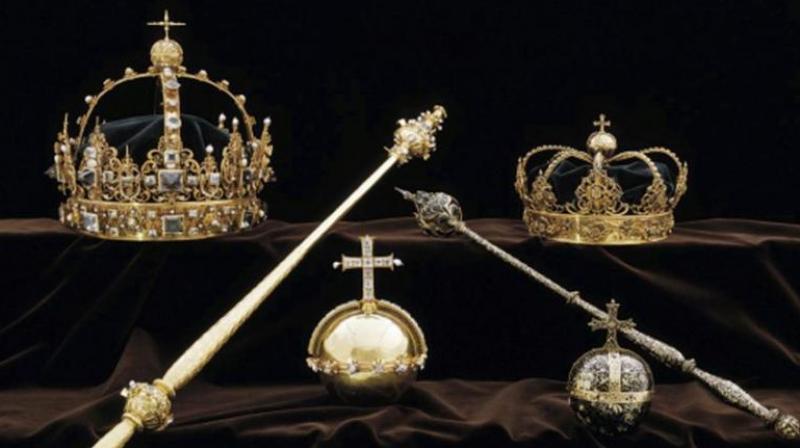Thieves steal Swedish royal crown, gold in broad daylight, flee in speedboat
The two men pulled off heist at Strangnas Cathedral at noon Tuesday and vanished aboard speedboat into vast patchwork of lakes around city.

Copenhagen (Denmark): Thieves carrying out a daring daytime robbery smashed a security case at a cathedral in Sweden and stole gold and jewel-encrusted crowns from the early 1600s before hopping on bicycles and escaping via a nearby lake, police said.
The two men pulled off the heist at Strangnas Cathedral at noon Tuesday and vanished aboard a speedboat or jet skis into the vast patchwork of lakes around the city, located 60 kilometres (37 miles) west of the Swedish capital of Stockholm, police said.
The stolen artifacts included a gold crown and an orb dating to 1611 that were made for King Karl IX’s funeral, as well as a jewel-encrusted crown dating to 1625 that was used in Queen Kristina’s funeral. The items were on display at an exhibition, and visitors were inside the cathedral when they were taken.
“The alarm went off when the burglars smashed the security glass and stole the artifacts,” Catharina Frojd, a spokeswoman for the 14th century cathedral, told AP.
Strangnas Cathedral said on its website that the stolen pieces were kept “in accordance with the prevailing safety regulations in locked and alarmed displays.” It gave no further details.
Police sent out a helicopter and boat to hunt for the thieves but found nothing. Authorities said no one was hurt in the robbery but didn’t provide further details.
Tom Rowell, a visitor who was eating lunch outside the Lutheran church, said he saw two men running from the cathedral toward a small nearby jetty where a motorboat was moored.
“The two men hurriedly jumped on board and it sped off,” Rowell said, adding that they “appeared non-Nordic.” He didn’t elaborate.
However, police spokesman Stefan Dangardt said “witnesses’ testimonies varied quite a bit” and it was also possible the thieves escaped on jet skis.
The men used two stolen black bicycles equipped with baskets and a child’s seat to race to the lake, Dangardt added.
On Wednesday, divers were looking for clues in and along the shores of Lake Malaren, Sweden’s third-largest freshwater lake. Police said the thieves could have fled further on jet skis.
While the stolen artifacts are of great historic and cultural value, police expressed skepticism about whether the burglary would bring the perpetrators financial gain.
The stolen pieces are “impossible to sell” because of their uniqueness and high visibility, Maria Ellior of the Swedish police’s National Operations Department told the Swedish news agency TT.
The theft would be logged at Interpol, enabling an international search, the agency.
Strangnas, a small, quiet town with a population of about 13,000, is popular with Stockholm commuters and tourists, who come to see the cathedral and a street that has been called the prettiest in Sweden.
The Gothic-style cathedral, built between 1291 and 1340, is in the heart of the town. The cathedral’s red-brick tower with a black top can be seen for miles (kilometres) around.
The cathedral was closed Wednesday, and a grassy area by the jetty was cordoned off as police inspected the ground for clues. Police also questioned witnesses who were inside the church at the time of the theft and people outside who saw the suspects get away.
The stolen artifacts are funeral regalia, which are placed inside or on top of a coffin to symbolize a deceased royal’s identity and social ranking.
While some funeral regalia are kept in the cathedrals of Strangnas, Uppsala and Vasteras, Sweden’s crown jewels are in vaults of the treasury under the Royal Castle in Stockholm.
In 2013, 16th-century copies of King Johan III’s crown, orb and scepter were stolen from the cathedral in the central Swedish city of Vasteras, 100 kilometres (60 miles) west of the capital Stockholm, during a night time burglary. They were eventually found and returned to the cathedral. No one was arrested.
Rowell, the witness, is getting married at the cathedral next weekend.
“It’s despicable that people would steal from a holy building,” he said.

